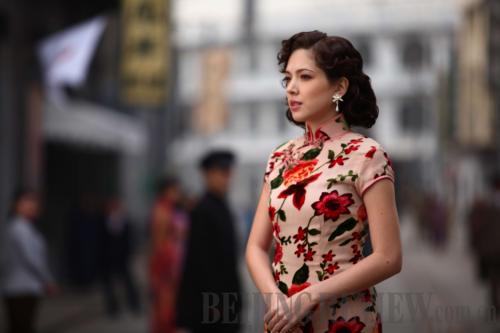|
 |
|
Chinese-Japanese film star Li Xianglan stars in the docudrama |
It was no easy task to acquire the archival footage. "We looked for [it] around the world, [in] museums in the UK and France," said Zhou. Archival museums in Shanghai proved to be a gold mine, though, as did the China Central Newsreel & Documentary Studio.
But stylistically speaking, apart from this aspect, The Bund is more drama than documentary. "I have been trying to create something new in filmmaking [for] years," said Zhou. His focus is on the characters, because, as he explained, "Shanghai is a city rich in legends and stories," making the docudrama format an inspired choice.
The dramatic elements found in the stories of Du Yuesheng and Li Xianglan are particularly well suited to the format. Du's underground political maneuverings (and the assassinations he ordered) during his reign as the Triad King in Shanghai are theatrically tense. Li, who played the role of the Chinese woman who falls for a Japanese soldier in many propaganda films during Japanese occupation, struggled deeply with an identity crisis rooted in strong personal loyalty to China. Her pain is palpable in the film.
The docudrama's production lasted a year, and cost $1.9 million to make. Filming the feature was more arduous than editing it, in spite of its myriad media. "It's not only a documentary, but a film with characters and stories," Zhou reiterated. "The actual shooting [was] more challenging and complex because it [required] more efforts in coordination." A daunting number of actors bring The Bund to life, speaking a smattering of languages, including Chinese, French, English and Japanese.
Unfortunately, some of this dramatic texture may be lost in the 47-minute version of the film slated to be shown internationally on the National Geographic Channel later this year. "The major difference [will] lie in the stories," said Zhou. Expected to be screened in Africa, the international version "tends to tell the historical events, while the [90-minute] film focuses more on people's fates, their feelings and emotions," he said.
Either way, Zhou hopes that The Bund will impact people's perceptions of Shanghai. "I hope my work can make people recognize that Shanghai is a magical and generous city," he said. It's a departure from conventional views on the city, which tend to pigeonhole the metropolis as posh and a little cold. The six stories Zhou tells are a cinematic achievement in that regard. Shanghai, as he said, is indeed "a birthplace of dreams and possibilities" no matter their outcome.
The feature-length version of The Bund will appear in Chinese cinemas later this summer.
|